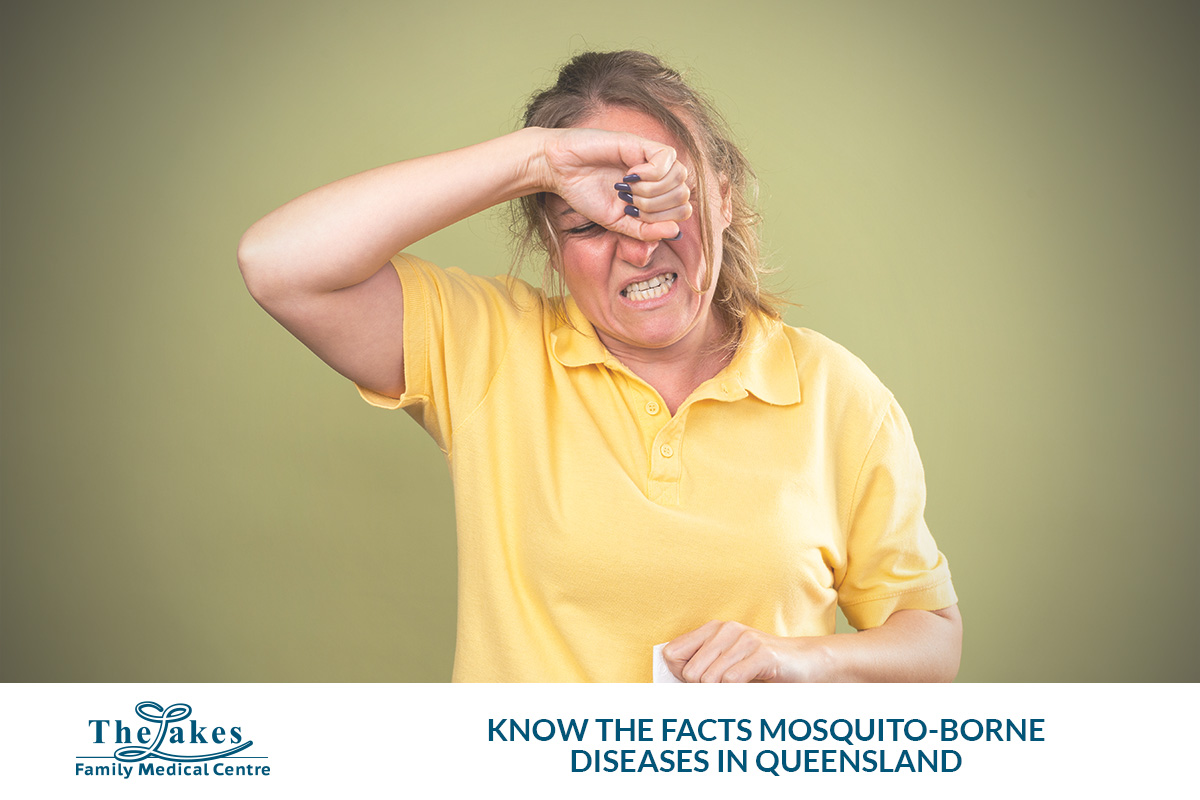
Living in Queensland means enjoying sunny days, warm nights and the great outdoors. However, it also means sharing our environment with mosquitoes. While most mozzie bites are harmless, some can transmit serious mosquito-borne diseases that affect people of all ages.
With increasing cases of Japanese encephalitis virus (JEV) and Ross River virus, it is more important than ever to understand the risks and how to protect yourself.
In this blog, you will learn:
- What mosquito-borne diseases are found in Queensland
- How mosquito-borne viruses spread
- Key symptoms to watch for
- Effective mosquito bite prevention strategies
- Who qualifies for the free JEV vaccine in Queensland
What Are Mosquito-Borne Diseases?
Mosquito-borne diseases are illnesses transmitted through the bite of an infected mosquito. Queensland’s warm, humid climate makes it an ideal breeding ground for mosquitoes, especially after heavy rainfall or flooding.
The most common mosquito-borne diseases in Queensland include:
- Ross River virus (RRV)
- Barmah Forest virus
- Japanese encephalitis virus (JEV)
- Murray Valley encephalitis (MVE)
- Dengue virus (more common in Far North Queensland and among returning travellers)
These viruses can cause anything from mild flu-like symptoms to severe neurological conditions. Preventing mosquito bites is your best protection.
Why Are Mosquito-Borne Diseases Increasing in Queensland?
Heavy rain, floods and extreme weather events create ideal breeding conditions for mosquitoes. Standing water in gutters, gardens, wetlands and bushland allows mozzies to multiply rapidly.
Additionally, migratory birds can introduce viruses like JEV to new areas. Mosquitoes pick up the virus after biting infected birds or pigs and then transmit it to humans.
Over the past few years, JEV has spread into parts of Southeast Queensland that were previously unaffected including Brisbane suburbs such as Hemmant. This shift makes mosquito prevention an urgent public health priority.
What Is Japanese Encephalitis Virus (JEV)?
Japanese encephalitis virus (JEV) is a rare but potentially life-threatening mosquito-borne disease that causes brain inflammation in severe cases.
How JEV spreads:
- Mosquitoes become infected after biting infected pigs or water birds.
- Humans then get infected through mosquito bites not from animals or other people.
- The Culex mosquito species is the primary carrier of JEV in Queensland.
Symptoms of JEV in humans:
Most people would not experience symptoms. However, in cases where illness develops, symptoms typically appear 5–15 days after the mosquito bite and may include:
- Fever
- Headache
- Vomiting
- Neck stiffness
- Seizures or tremors
- Confusion or disorientation
- Coma in severe cases
If you develop these symptoms after being bitten by a mosquito, seek medical advice immediately.
Which Animals Are Affected by JEV?
Pigs and wading birds are the main animal hosts for JEV. While most infected pigs do not show signs of illness, pregnant sows may miscarry or give birth to stillborn piglets. Horses may also become infected and display mild neurological symptoms.
Is it safe to eat meat from infected animals?
Yes, eating meat from animals infected with JEV does not transmit the virus to humans.
If you suspect your animals are showing signs of JEV, contact your veterinarian or Biosecurity Queensland
Who Tracks Mosquito-Borne Diseases?
Queensland Health runs a mosquito surveillance program in collaboration with local councils. Scientists use mosquito traps equipped with honey-soaked cards that mosquitoes feed on. These cards capture saliva samples, which are tested for viruses like JEV, Ross River and MVE.
This monitoring system allows authorities to:
- Detect outbreaks early
- Identify mosquito hotspots
- Provide targeted public health alerts
- Guide vaccine rollout in at-risk areas
How to Prevent Mosquito Bites in Queensland
Protecting yourself from mosquito bites is essential, especially during summer and after floods.
Practical mozzie-bite prevention tips:
- Use insect repellent with DEET, Picaridin or Oil of Lemon Eucalyptus
- Wear long sleeves and trousers, especially during dawn and dusk
- Install flyscreens on windows and doors at home
- Use mosquito coils, insecticide sprays or vapour devices when outdoors
- Sleep under mosquito nets when camping or travelling in high-risk areas
- Empty and clean water containers around your home weekly
By following these steps, you can significantly reduce your risk of being bitten and exposed to mosquito-borne viruses.
Who Can Get the Free JEV Vaccine in Queensland?
Due to limited supply, the Japanese encephalitis vaccine is currently available for free to people considered at higher risk of exposure.
You may be eligible if you:
- Work at or live near a piggery or pork abattoir
- Work outdoors in areas where JEV has been detected
- Live in or plan to visit a high-risk local government area
- Have children (aged 2 months or older) living in at-risk areas
As Queensland Health continues monitoring and detection efforts, eligibility will expand to include more regions.
Other Mosquito-Borne Diseases in Queensland
Besides JEV and Ross River virus, Queensland monitors a range of mosquito-borne illnesses, including:
- Barmah Forest virus
- Murray Valley encephalitis (MVE)
- Dengue fever
- Chikungunya
- Zika virus
- West Nile virus (Kunjin subtype)
- Malaria (among returned travellers)
- Yellow fever
All of these viruses are either locally present or monitored due to their global spread. Each has unique risks and there are no vaccines for most, so bite prevention is vital.
Conclusion: Protect Yourself and Your Family from Mosquito-Borne Illness
Mosquitoes are not just a summertime annoyance in Queensland they can carry serious health threats. With mosquito-borne diseases like Japanese encephalitis virus and Ross River virus becoming more common, protecting yourself and your family is more important than ever.
Stay informed, take preventive action and know the signs and symptoms to look out for. And if you are eligible, speak to a healthcare professional about the JEV vaccine.
At Lakes Family Medicine in Brisbane, our experienced general practitioners can help you stay on top of your health with advice on mozzie prevention, vaccine access and managing symptoms if you are feeling unwell.
Source: https://www.health.qld.gov.au/newsroom/news/know-the-facts-mozzie-borne-diseases-in-queensland




